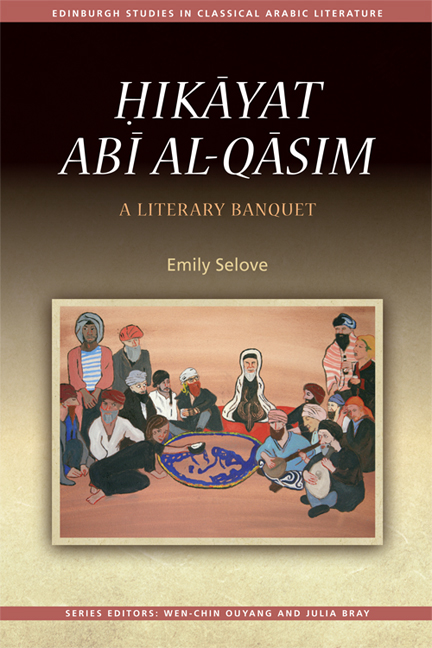5 - The Cosmic Crasher
Published online by Cambridge University Press: 05 September 2016
Summary
O Nature, and O soul of man! How far beyond all utterance are your linked analogies! Not the smallest atom stirs or lives on matter, but has its cunning duplicate in mind.
Captain Ahab in Melville, Moby-Dick, ‘The Sphynx’Seems to me some sort of Equator cuts yon old man, too, right in his middle. He's always under the Line …
Melville, Moby-Dick, ‘The Deck’Al-Azdī tells us that Abū al-Qāsim is based on a real person that he once knew, though he does not suggest that this friend was himself named Abū al-Qāsim. We may have reason to believe that the name was designed to achieve a particular effect, for it is also the name of the prophet Muḥammad, whose son Qāsim passed away at a young age (the Prophet's kunya, or filionymic, means ‘Father of Qāsim’). Abū al-Qāsim's ism (given name) as it is found at the beginning of the text, Aḥmad (another name for the Prophet, derived from the same root as the name Muḥammad), strengthens this impression. The use of names associated with Muḥammad to designate a man of Abū al-Qāsim al-Baghdādī's qualities may at first strike us as inappropriate, but closer examination shows that the prophet and Abū al-Qāsim share more than a name alone. Both are at once real human beings, and ‘the cosmic individual in whom all [the Islamic Community's] faculties are realized.’ This is H. A. R. Gibb's characterisation of the prophet Muḥammad in the view of mystical Islam, but it could just as well describe Abū al-Qāsim, introduced as an all-encompassing intersection of all the people of Baghdad.
In many ways Abū al-Qāsim seems a travesty of the prophet, suggesting the distance between the ideal of the Islamic umma (community) as embodied in Muḥammad's epic person, and contemporary Baghdadi discourse, which, as it is represented in the Ḥikāya, tends towards decadent worldliness. Indeed in the closing passage of the Ḥikāya, the author describes his protagonist as ‘tantamount to Satan’, a comparison whose aptness is described below in the section ‘Abū al-Qāsim as Iblīs’.
- Type
- Chapter
- Information
- Hikayat Abi al-QasimA Literary Banquet, pp. 135 - 166Publisher: Edinburgh University PressPrint publication year: 2016



